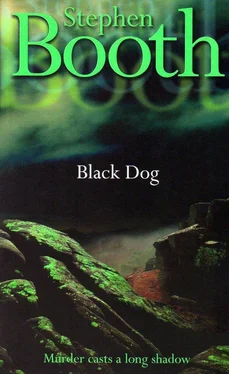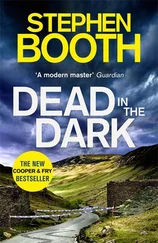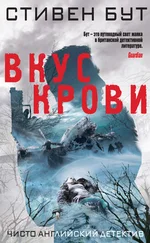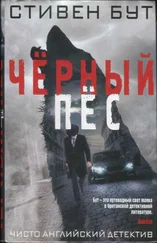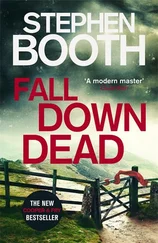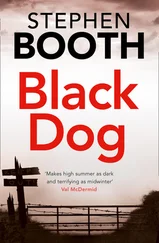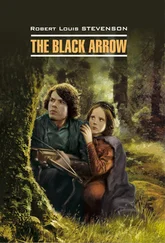black dog: 1. melancholy, depression of spirits; ill humour. In some country places, when a child is sulking, it is said ‘the black dog is on his back.’
(Oxford English Dictionary)
The sudden glare of colours beat painfully on the young woman’s eyes as she burst from the back door of the cottage and hurled herself into the brightness. She ran with her bare feet slapping on the stone flags and her hair streaming in red knots from her naked shoulders.
A harsh voice was cut off suddenly when the door slammed behind her, isolating her from the house. As she sprinted the length of the garden, she stirred the dust from a flagged path whose moisture had been sucked out and swallowed by the sun. A scarlet shrub rose trailed halfway across the path and a thorn slit the flesh of her arm as she brushed against it, but she hardly felt the pain.
‘Wait!’ she called.
But the old wooden garden gate had banged shut on its spring before she could reach it. She threw herself on to the top of the dry-stone wall, flinging out an arm to clutch at the sleeve of the old man on the other side. He was wearing a woollen jacket, despite the heat, and his arm felt stiff and sinewy under the cloth. The young woman scrabbled for a firmer grip, feeling his muscles slide against the bones under her fingers as if she had plunged her hand deep into his body.
Harry Dickinson paused, held back only by the hand that touched his arm, turning his face away from the appeal in his granddaughter’s eyes. The only change in his expression was a slight tightening in the creases at the sides of his mouth as his gaze slipped past Helen to the row of stone cottages. The stone walls and the white-mullioned back windows were at last starting to cool in the early-evening shade, but the sun still glared low over the slate roofs, bad-tempered and unrelenting. The pupils of Harry’s eyes narrowed to expressionless black points until he tilted his head sideways to turn the peak of his cap into the sun.
Helen could smell the impregnated odours of earth and sweat and animals in the wool, overlaid by the familiar scent of old tobacco smoke. ‘It’s no good walking away, you know. You’ll have to face it in the end. You can’t run away from things for ever.’
A loud juddering sound made Harry flinch as it passed across the valley behind him. For an hour now the noise had been moving backwards and forwards over the dense woodland that covered the slope all the way down to the valley bottom. The sound echoed against the opposite hillside like the beating wings of an angry bird, battering the gorse and heather and alarming the sheep scattered on the upper slopes.
‘We’ll understand,’ said Helen. ‘We’re your family. If only you’d tell us...’
The old man’s right arm was held out at an unnatural angle, creasing the sleeve of his jacket into an ugly concertina of fabric. She knew that Harry felt himself being physically tugged towards the woods along the valley side; his body was tense with the effort of resisting the pull. But emotionally he was being drawn in two directions. The conflicting pressures only seemed to strengthen and toughen him, setting his shoulders rigid and hardening the line of his jaw. His face held no possibility of turning away from whatever he had decided to do.
‘Granddad? Please.’
The sharp edges of the stone wall were digging into her thighs through her shorts, and the skin of the palm on her left hand stung where she had scraped it on the jagged topping stones. There had been a sudden, desperate rush, a moment of overwhelming emotion, and now she didn’t know what to say. She felt the impotence of the conventions that surrounded the communication between one adult and another, even when they were members of the same family. She shared with her grandfather an inborn shortage of the words she needed to be able to express her feelings to those closest to her.
‘Grandma is very upset,’ said Helen. ‘But she’ll calm down in a minute. She’s worried about you.’
Helen had never needed many words before, not with Harry. He had always known exactly what she wanted, had always responded to the message in her eyes, to the shy, adoring smile, to the gleam of sun on a wave of flame-coloured hair, and to a small, trusting hand slipped into his own. She was no longer that child, and hadn’t been for years. A teacher learned a different way of communicating, a calculated performance that was all surface gloss and scored no marks for feeling. Harry still understood, though. He knew what she wanted him to do now. But it was too hard for him, a thing completely against a lifetime’s habit.
Gradually the juddering noise was fading to the edge of audibility, muffled to a dull rattle by the trees and the folds of the land. Its temporary absence released the subtler sounds of the evening — a current of air stirring the beech trees, a cow moaning for the bull across the valley, a skylark spilling its song over the purple heather. Harry cocked an ear, as if listening for a voice that no one else could hear. It was a voice that deepened the sadness in his eyes but stiffened his back and tautened the clench of his fists and his grip on the loop of worn black leather held in one hand.
‘Come back and talk to us. Please?’ she said.
Helen had never heard that voice. She had often tried, staring intently up at her grandfather’s face, watching his expression change, not daring to ask what it was he heard, but straining her own ears, desperate to catch an elusive echo. Like most men who had worked underground, Harry spent as much of his time as he could outside in the open air. As she stood at his side, Helen had learned to hear the sounds of the woods and the sky, the tiny movements in the grass, the shifting of the direction of the wind, the splash of a fish in a stream. But she had never heard what her grandfather heard. She had grown up to believe it was something uniquely to do with being a man.
‘If you don’t want to talk to Grandma, won’t you tell me about it, Granddad?’
And then the noise began to grow steadily louder again, clattering towards them as it followed the invisible line of the road that meandered along the valley bottom. It drew nearer and nearer across the rocky slopes of Raven’s Side, skirting a sudden eruption of black basalt cliff and veering north once more towards the village until it was almost overhead. The din was enough to drown out normal speech. But it was then that Harry chose to speak, raising his voice defiantly against the clattering and roaring that beat down on him from the sky.
‘Noisy bastards,’ he said.
The helicopter banked, its blue sides flickering in the fragmented shadows of its blades. A figure could be seen, leaning forward in the cabin to stare at the ground. The lettering on his door read ‘POLICE’.
‘They’re looking for that girl that’s gone missing,’ said Helen, her voice scattered and blown away by the roar. ‘The Mount girl.’
‘Aye, well. Do they have to make so much row about it?’
Harry cleared his throat noisily, sucking the phlegm on to the top of his tongue. Then he pursed his thin lips and spat into a clump of yellow ragwort growing by the gate.
As if taking offence, the helicopter moved suddenly away from the edge of the village, sliding towards a row of tall conifers that grew in the grounds of a large white house. The pitch of the noise changed and altered shape as it passed the house, tracing the outline of the roofs and chimneys like an echo locator sounding the depths of an ocean trench.
‘At least it’ll wake that lot up as well.’
‘Granddad—’
‘There’s nowt more to be said. Not just now.’
Читать дальше
Конец ознакомительного отрывка
Купить книгу
